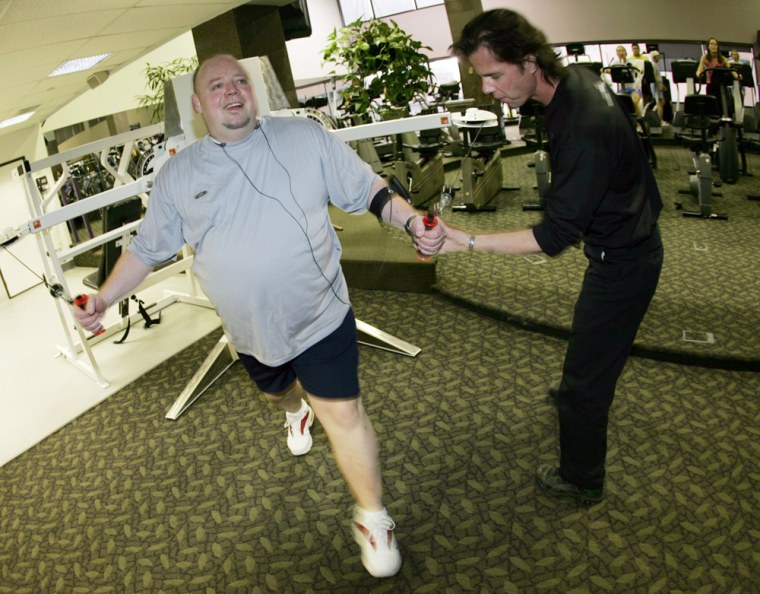How can you find a personal trainer who's fit for the job? And are there any ways to save money on trainers? Smart Fitness answers your queries. Have a fitness question? To e-mail us, click here. We’ll post select answers in future columns.
Q: I've read that it's so easy to become a personal trainer that some people get their certification over the Internet in a weekend. If that's true, how do I go about finding a trainer who's truly qualified? I need someone good to help me stick with a fitness plan and lose some weight.
A: Industry experts estimate there are anywhere from 40 to 400 personal training certification programs available, so it's easy to see why consumers like yourself would have questions about where to start in finding a good fitness pro.
"Over the last several years, everybody and their grandma is coming out with a certification," says Neal Pire, a New York-based personal trainer who serves as chair of the personal training certification committee for the American College of Sports Medicine.
But if you're shelling out $60 or more an hour on a trainer, you'll want to make sure you're spending your money wisely. A good trainer can assess your health and fitness status, suggest a safe and appropriate exercise regimen and keep you motivated to stick with it. A bad trainer may not know enough to design an appropriate plan or keep you working at a safe pace.
So what should you look for in a personal trainer? One new development that may help consumers sort through the many certification programs is a recommendation by the Boston-based International Health, Racquet and Sportsclub Association (IHRSA) that programs become accredited by a third-party agency such as the National Commission for Certifying Agencies.
IHRSA has asked that, starting next January, its member clubs only hire personal trainers who have been certified by a group that has at least initiated the accreditation process.
Accreditation doesn't necessarily mean that one certification program produces better trainers than another. But it's a good sign, experts say, because it means that a group's certification standards are sound — which is not likely to be the case with Web outfits that send training certificates to people who do little more than give out their credit card numbers.
"We believe our recommendation, if followed, will prevent consumers from relying on a certified personal trainer who may have never had to demonstrate an appropriate level of expertise before becoming certified," says Tom Richards, public policy manager for IHRSA.
Already accredited are the certification programs of the National Strength and Conditioning Association and the American Council on Exercise. The American College of Sports Medicine is in the process of seeking accreditation, according to Pire.
Beyond certification, there are other qualifications you should look for in a trainer. "There's a lot more to it than just the credentials," says Pire.
Be sure to ask about experience, particularly experience with people like you, he says. So if you're hoping to improve your golf game, for instance, or you're someone with a heart condition or arthritis, seek out a trainer with expertise and experience in those areas.
Also ask how well the trainer keeps up with developments in the field through continuing education, and whether he or she has college-level experience in exercise physiology or a related field.
In addition, you'll want to find someone with good references and with whom you feel comfortable.
Just keep your expectations in check. Don't look to a personal trainer to perform miracles for you. Hourly sessions with a trainer can help, but "what about the other 23 hours?" asks Shannon Morgan, a personal trainer in Newport Beach, Calif.
The hardest part of staying fit can be sticking with your exercise and diet plan when there isn't someone watching over you.
Buddy up, cut costs
Q: I would love to hire a personal trainer but I can't afford one. Any advice?
A: Keep in mind that not everyone hires a personal trainer to work with them every week. Some people just need a few initial consultations to get them on the right track. Others might check in with a trainer a couple times a month, or even less often, for encouragement, support or to monitor their progress.
Others pair up with a buddy to share the costs of personal training, a practice that appears to be on the rise, according to a survey of 281 fitness clubs in the United States and Canada that was released last year by the IDEA Health and Fitness Association in San Diego.
In 2004, 65 percent of clubs surveyed offered personal training with two clients, compared with 42 percent in 1998. And 42 percent of clubs offered personal training involving three to five people in 2004, compared with 33 percent in 1998.
IDEA executive director Kathie Davis says pairing up for personal training not only saves money but can also help you stay on track because you have someone else keeping you company — and pushing you to show up.
